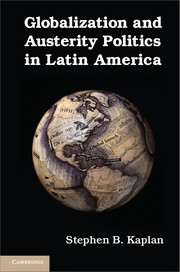Book contents
- Frontmatter
- Contents
- List of Figures
- List of Tables
- Acknowledgments
- 1 Introduction
- 2 Globalization and Austerity Politics
- 3 The Political Economy of Elections
- 4 The Electoral Boom-Bust Cycle
- 5 From Gunboat to Trading-Floor Diplomacy
- 6 When Latin American Grasshoppers Become Ants
- 7 The Political Austerity Cycle
- 8 Conclusion
- Appendix: Field Research Interviews
- Bibliography
- Index
- Other Books in the Series (continued from page iii)
6 - When Latin American Grasshoppers Become Ants
Published online by Cambridge University Press: 05 February 2013
- Frontmatter
- Contents
- List of Figures
- List of Tables
- Acknowledgments
- 1 Introduction
- 2 Globalization and Austerity Politics
- 3 The Political Economy of Elections
- 4 The Electoral Boom-Bust Cycle
- 5 From Gunboat to Trading-Floor Diplomacy
- 6 When Latin American Grasshoppers Become Ants
- 7 The Political Austerity Cycle
- 8 Conclusion
- Appendix: Field Research Interviews
- Bibliography
- Index
- Other Books in the Series (continued from page iii)
Summary
“Why not come and chat with me,” said the Grasshopper, “instead of toiling and moiling in that way?” “I am helping to lay up food for the winter,” said the Ant “and recommend you to do the same.” “Why bother about winter?” said the Grasshopper. “We have got plenty of food at present.”
In Aesop's classic fable, a carefree grasshopper joyfully chirps throughout a summer's day. By contrast, an industrious ant hauls an ear of corn to his nest. When winter arrives, the ill-prepared grasshopper wrestles with life-threatening hunger, whereas the ants enjoy the fruits of their labor. In the world of economic policy, the grasshopper's chirps are the politician's printing press. Politicians can spend lavishly today or save for a wintery day. Many classic political economy works expect presidents to spend like the profligate grasshopper. Politicians worry about their short-term political survival rather than longterm socioeconomic welfare.
But, when do they instead choose frugality? Developed country scholars contend that fiscally conservative voters promote miserly political behavior. At first, the claim that conservative politics pays electoral dividends does not seem to travel well to Latin America, a region hobbled by high poverty, income inequality, and unemployment. Facing strong redistributive pressures, why would politicians believe that voters are inflation hawks? Why would election minded incumbents value a seemingly long-run asset such as economic stability? What's the political benefit of low inflation? Presumably, delivering growth and jobs today offers the greatest electoral returns tomorrow.
If this is the case, why do Latin American politicians sometimes drift from this reliable political strategy?
- Type
- Chapter
- Information
- Globalization and Austerity Politics in Latin America , pp. 188 - 249Publisher: Cambridge University PressPrint publication year: 2013



